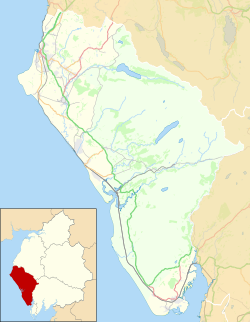Church in Cumbria, England
| St George's Church | |
|---|---|
 St George's Church, Millom, from the northeast St George's Church, Millom, from the northeast | |
  | |
| 54°12′32″N 3°16′18″W / 54.2088°N 3.2718°W / 54.2088; -3.2718 | |
| OS grid reference | SD 172,800 |
| Location | Millom, Cumbria |
| Country | England |
| Denomination | Anglican |
| Website | St George, Millom |
| History | |
| Status | Parish church |
| Architecture | |
| Functional status | Active |
| Heritage designation | Grade II |
| Designated | 8 September 1967 |
| Architect(s) | Paley and Austin |
| Architectural type | Church |
| Style | Gothic Revival |
| Groundbreaking | 1874 |
| Completed | 1877 |
| Specifications | |
| Materials | Sandstone, slate roofs |
| Administration | |
| Province | York |
| Diocese | Carlisle |
| Archdeaconry | Westmorland and Furness |
| Deanery | Furness |
| Parish | Millom |
| Clergy | |
| Vicar(s) | Revd Malcolm Cowan |
St George's Church is in the town of Millom, Cumbria, England. It is an active Anglican parish church in the deanery of Furness, the archdeaconry of Westmoreland and Furness, and the diocese of Carlisle. Its benefice is united with those of St Anne, Thwaites, Holy Trinity, Millom, and St Luke, Haverigg. The church is recorded in the National Heritage List for England as a designated Grade II listed building. It is a prominent landmark in the town.
History
The church was built between 1874 and 1877 to serve the growing town of Millom. It was designed by the Lancaster architects Paley and Austin. The church cost about £12,000 (equivalent to £640,000 in 2023), of which £7,186 was given by the Millom Ironworks. The site for the church was given by the Earl of Lonsdale.
Architecture
Exterior
St George's is constructed in red sandstone with ashlar dressings, and has slate roofs. Its plan is "markedly asymmetrical", and consists of a four-bay nave with a north aisle, a central tower with a transept to the north, a south vestry, and a chancel. The nave and the aisle have two-light windows on the sides and three-light windows at the east ends. At the west end, the nave has a five-light window, and the aisle a two-light window. All the windows contain Geometrical-type tracery. The tower has gabled angle buttresses, a stair turret to the northeast, two two-light windows on the south side, pairs of louvred two-light bell openings, and an embattled parapet with pinnacles. It is surmounted by an octagonal spire with lucarnes. The chancel has a five-light east window and three-light windows on each side. It is surmounted by a traceried parapet and has a cross on its gable.
Interior
All the fittings were designed by Paley and Austin, other than the lectern. The east window and the window on the north side of the chancel (the latter dated 1911), are by Heaton, Butler and Bayne; the window on the south side, dated 1906, is by Seward and Company. On the north side of the church is a memorial window to Norman Nicholson, a local poet who died in 1987. It was designed by Christine Boyce, inserted in 2000, and includes depictions of a bee orchid, a bloody cranesbill, Halley's Comet, and quotations from Nicholson's work. The original organ was built in about 1877 by Alfred Kirkland. It was replaced in 1972 with an organ by Keates that was moved from Morley. There is a ring of six bells, all cast by John Warner & Sons; the oldest dates from 1876, and the other five from 1921.
External features
Outside the church is a memorial to the Boer War dated 1905. It consists of a Celtic-type cross on a tall shaft in a square enclosure. The memorial is carved with a vine, and dragon eating its tail. It is a Grade II listed building.
See also
References
- St George, Millom, Church of England, retrieved 24 July 2011
- ^ Historic England, "Church of St George, Millom (1065710)", National Heritage List for England, retrieved 28 June 2012
- ^ Hyde, Matthew; Pevsner, Nikolaus (2010) , Cumbria, The Buildings of England, New Haven and London: Yale University Press, pp. 525–526, ISBN 978-0-300-12663-1
- UK Retail Price Index inflation figures are based on data from Clark, Gregory (2017), "The Annual RPI and Average Earnings for Britain, 1209 to Present (New Series)", MeasuringWorth, retrieved 7 May 2024
- Brandwood, Geoff; Austin, Tim; Hughes, John; Price, James (2012), The Architecture of Sharpe, Paley and Austin, Swindon: English Heritage, p. 228, ISBN 978-1-84802-049-8
- Cumberland (Cumbria), Millom, St. George (N01679), British Institute of Organ Studies, retrieved 24 July 2011
- Cumberland (Cumbria), Millom, St. George (D01903), British Institute of Organ Studies, retrieved 24 July 2011
- Millom, S George, Dove's Guide for Church Bell Ringers, retrieved 24 July 2011
- Historic England, "War memorial immediately to north of Church of St George, Millom (1086621)", National Heritage List for England, retrieved 28 June 2012
| Churches in the Deanery of Furness | |
|---|---|
| Benefice of Aldingham |
|
| Benefice of Broughton and Duddon |
|
| Benefice of Coniston and the Crake Valley |
|
| Benefice of Dalton-in-Furness |
|
| Benefice of Kirkby Ireleth |
|
| Benefice of Millom |
|
| Benefice of Pennington |
|
| Benefice of Ulverston | |
- Churches completed in 1877
- 19th-century Church of England church buildings
- Gothic Revival church buildings in England
- Gothic Revival architecture in Cumbria
- Church of England church buildings in Cumbria
- Grade II listed churches in Cumbria
- Diocese of Carlisle
- Paley and Austin buildings
- Millom
- 1877 establishments in England